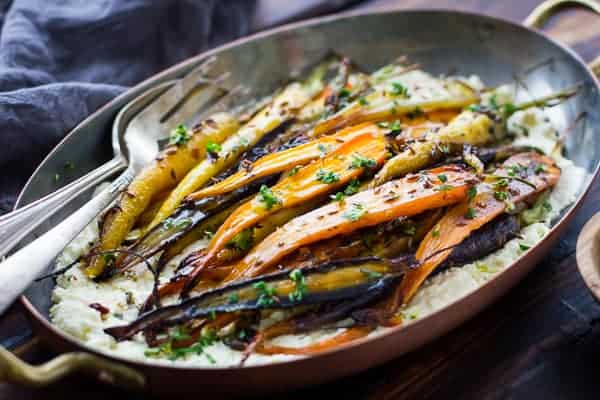
{UPDATE and spoiler: I did get the book deal I was looking for! Read more about why I said YES here, and read all about my book and where to order it here.}
The past month has been a bit of a roller coaster.
I've wanted to publish a cookbook for as long as I can remember, and I finally got the opportunity when a publisher contacted me last month. After weeks of negotiations, consulting, emails, phone calls, and boring Jay with every minute detail (the man has the patience of a saint), I finally declined the offer. Since many bloggers are finding themselves in similar situations, and information is hard to come by, I wanted to share the experience a bit (or as it turned out - a lot) here. Please note: I am in no way an expert in cookbook publishing, so please don't take any of the numbers stated here as the gospel truth. (And if you're just here for the carrots, feel free to skip down to the recipe below.)
Food bloggers are attractive to book publishers for several reasons. On the positive side, we often have an established audience that comes from years of diligent posting. We don't just create content, we create community based around our values and aesthetic. We have a strong network with other bloggers and food professionals. We're supposedly good at self-promotion (ha), and sometimes we take pictures of food that are high enough quality for print.
On the downside, since most of us don't work in the field of writing, publishing, or photography, many of us don't realize our worth. Getting information about industry standards for writing, recipe development, and photography is difficult, so we often charge below market value or are willing to work for free. This results not only in us being broke, it also undercuts the market and short-changes the professionals who make a living doing what we will do for free.
Publishing a cookbook is the end goal for many food bloggers, whether or not we began with that in mind. I started my blog simply as a way to share a recipe that I was proud of and wanted to put out in the world. I had actually begun to write a novel, and the teacher of a writing class I attended, Leslie Keenan, suggested starting a blog in order to put my work out there. I dismissed the idea at first, but, inspired by other food blogs I read, eventually decided to go for it. I enjoyed sharing recipes and images on this space so much that the novel quickly fell away. In recent months, I began gathering recipes for a cookbook, working on a proposal, and researching agents. I'd been focused on this for a good six months when a publisher contacted me. They wanted to publish a book together.
When I first saw this publisher's email, I felt flattered to even be asked. Visions of cookbooks filled with my recipes and photos danced in my mind. Maybe my parents would finally stop harassing me about getting a real job. Maybe I'd earn a bit of cash. Maybe I could finally buy a smart phone. But a couple of online articles gave me a dose of reality: 9 Questions for When the Book Publisher Calls by Dianne Jacob, and When is a Cookbook Deal Too Good to Be True? by Justin Schwartz. If you're considering signing a contract, have a read through these first – I found them extremely eye-opening.
In addition to reading (and re-reading) those articles, I did as much online research as I could to help me come to a decision, Numbers were difficult to find, so I ended up reaching out to a handful of published authors and professional photographers, friends and strangers alike. All were happy to share their experiences and help shape my decisions as I navigated the many hurdles of the offer.
Hurdle #1: The topic that the publisher wanted wasn't exactly what I wanted to write about.
I had spent the last 6 months putting together a proposal for a specific topic. This included researching the competition (other cookbooks on similar topics), reading statistics and articles on the subject, brainstorming recipe ideas every waking moment of the day (and sometimes even in my sleep), and beginning to test out some recipes to make sure I had a good handle on the beginnings of a book. I even hired a consultant, the same writing teacher who had encouraged me to start my blog five years previously, to edit my proposal. In other words, I had put a ton of time, thought, and a bit of money into my topic already and was loath the set it aside and start fresh with something else.
Hurdle #2: The time frame was short.
The publisher wanted the manuscript and 75-100 recipes handed in within 5 months, and around 130 images a month later. I calculated that 1 out of the 5 months alone would be spent having others test my recipes and making edits to the manuscript, so that left me with 4 months to develop the content. I would be allowed to reuse up to 20% content from my blog, which left a minimum of 60 new recipes to develop, or 4 new recipes per week. Most baked goods recipes take me around 4 tries to get right, so that meant making 16 recipes per week. There would be no wiggle room if I got behind, or if I got stuck with a recipe that wouldn't turn out. Additionally, I would need to be shooting the recipes as I made them. Each shoot of a final dish takes me about 2 hours. Including shopping for ingredients, baking, cleaning up, shooting, and writing, all of this work would add up to roughly 60 hours per week.
There was a chance that I could make it happen, but only if I did nothing else for the next 6 months. I would have to drop my blog, social media, other freelance projects, and cancel a working vacation I'd already planned. I asked the publisher whether the time was negotiable, but they said the most they could push back the project was 2 weeks because of their tight publishing schedule. I thought that perhaps I could use some of the advance to hire help to complete the project – maybe a photographer or stylist. Which brings me to...
Hurdle #3: The advance was low.*
The initial offer was $8,000 total, including the images. According to the Dianne Jacob article, advances for cookbooks from first-time authors range from $3,500-$25,000, and professional photographers charge $20,000-30,000 to shoot the images. I know that an advance (which means advance payment of royalties) is different than being paid a flat or hourly rate for a project. Authors have the benefit of earning royalties once the advance has been made back from sales, so for this reason, an advance will rarely translate into a good hourly rate upfront, and authors hope to recoup their time and costs via royalty payments over the years. All photography and ingredient costs come out of the pocket of the author. Unfortunately, 7 out of 10 books never earn out, so it's always safer to negotiate the best advance that you can. A larger advance also gives publishers a bigger incentive to push your book once it's released (though most of the marketing is also left up to the author).
I realized that accepting this offer would be sheer madness. We would be losing money upfront, and wouldn't see royalties for two years after release of the book. I'm a slow, diligent worker, not fast or slipshod, and I don't do well under pressure. I would have been a disaster.
So I declined the offer a first time, citing these three factors and my thinking that I wouldn't be able to produce work that was up to my standards with the time and budget allotted. I wished the editor the best of luck in finding the right author, and figured that was that.
But it wasn't.
To my surprise, they came back offering more time (10 months), a slightly higher advance ($10,000), and a way to integrate the framework and recipes I had already created into their concept. I was honored that they were willing to be so flexible. I thought, "They must really want me!" Though I didn't understand why the publisher had refused more time upfront until I was ready to walk away from the deal, I decided to go ahead with the project.
Hurdle #4: Everything is negotiable and I suck at negotiating.
I had a call with the editor, who was very nice. We discussed the design and price of the book. I was concerned that I wouldn't have a say over the final design, but he assured me that I would, though the publisher would have the final say. Then he sent me the contract. "The contract is my least favorite part," he said. "I wish we didn't have to make them at all." He warned me that it would be 13 pages, written in legalese, and that there would be clauses that would rub me the wrong way. He advised me to read through it and get back to him with questions. "We'll get through it," he assured me.
Hurdle #5: The contract was 13 pages of legalese.
The first paragraph of the contract made my eyes cross, so I hired a consultant – a friend of a friend who works in publishing and who I trust very much – to look through it. Thank goodness I did. Still concerned with the low advance, I asked the consultant if he thought I should hire an agent. He said that if the advance was no longer negotiable, hiring an agent probably wouldn't be necessary. "Let's see what kind of shape the contract is in first," he said.
I spent the next two days floating on a cloud. I was going to publish a cookbook! My lifelong dream! I told everyone I knew.
Hurdle #6: The royalty rates were low.*
I came home the second night to check my email (because I still don't have a smart phone and have to check my email on a laptop, the old-fashioned way) and my elation fizzled like a day-old souffle. My consultant had found several red flags in the contract, the most egregious being that the royalty rate was, according to both him and the Dianne Jacob article, half of the industry standard, at 8% net or about 4% of the price of each book. Both Dianne Jacob and my consultant quoted the normal rate as 7.5% of the book's cost. I can understand a publisher playing it safe with an advance, since that's a risk they're taking, but royalties for authors are so low anyway that to skimp out on those just seems mean.
Royalty rates explained
Royalty rates are calculated either by a percentage of the price of the book (called "list") or a percentage of the wholesale price (usually 50% of the list price, called "net"). Since the list price is twice the net price, the net royalty rate should be double the list royalty rate. (If you think that's incredibly confusing, it is!) The consultant said, and my research confirmed, that the average royalty rate for a cookbook is 7.5 - 10% list, or 15-20% net. That already isn't much, considering that I would be creating all of the content. But this publisher was offering me half of this, at a rate of 8% net, which translates to 4% of the price of the book. So for every $20 book sold, I would receive only 80 cents, and only after my $10,000 advance had been repaid to the publisher. That seemed like too little considering the hundreds of hours I would be putting in. A low royalty rate also means that it will take longer to earn out the advance. The publisher estimated that it would take 2 years to earn out at this rate; were the rate the normal 15% net, or closer to $1.60 per book, I would have begun earning royalties a year sooner. So for this project, I would be making a grand total of $10,000 for three years.
The strange part was that when I asked to negotiate the royalty rate, the publisher insisted that their offer was on par with the industry standard. "This is not a lowball offer," he wrote, and refused to budge beyond escalating the rate to 10% net (still below industry standard) only after 10,000 copies had sold. I scoured the internet and didn't find any evidence of royalty rates below 12% net (a.k.a. 6% list). Maybe the publisher was correct, but I decided I needed to find that out for myself rather than taking his word for it and wondering for the next 10 years whether I'd made a poor decision.
Hurdle #7: I no longer felt that I could trust my publisher.
My editor's words were incongruous with those of my consultant and of several findings online, so I didn't know whether he was telling the truth or not. I didn't know who to believe, but the odds were not in his favor. On top of this, the royalty rate wasn't the only red flag in the contract. I couldn't trust that the publisher was interested in my well-being, particularly after having made the first initial (crazy) offer that I had turned down. Now it seemed they were trying to take advantage of an inexperienced writer through a convoluted contract. I understand the need for publishers to protect themselves, but the contract seemed to go above and beyond that and skew toward taking away many of the rights that authors normally have. For example, one clause stated that they could refuse to publish the book at any time and for any reason with no liability to the author, a clause that my consultant dubbed inappropriate. "This should be taken out," he said. (Please note that this was my first experience with a contract, so it is entirely possible that this clause and the rest of the contract were perfectly normal.)
Hurdle #8: I was already exhausted and I hadn't even started working on the book yet.
I imagined having to fight my way through the rest of the contract, sinking more time into arguing clauses that my consultant claimed were unusual and needed to be removed. As Jay pointed out, the editor was getting paid for his time here, whereas all of the hours I had sunk into this offer so far were on my own time. Plus, I had to spend money on consultants since I don't have the experience to understand this type of contract. I wasn't about to hire an agent for this deal, since, as my consultant put it, "An agent is best used to get the best possible deal you can, not an average offer from a publisher who is offering you less than what they should." I pictured spending the next 10 months hard at work, wondering whether I should have waited for something that felt more fair, and the following ten years (or as long as the book was in print) questioning the royalty rate.
I asked my consultant whether I should walk away, and he said, "At the end of the day, it needs to feel like and be a partnership between you and your publisher, they should be your biggest advocate for book success, rather than another adversary."
I declined the offer a second and final time.
Now that the whole ordeal is over, I feel sad and relieved at the same time, like when you get out of a relationship that wasn't working. Maybe it wasn't healthy, but at least it was something. Maybe I won't be offered a better deal in terms of royalties and advance, but at least I'll know that rather than having to wonder. In any case, I'm glad I made the choice that I did, and that I got such good advice from a bunch of people who were generous enough to share their knowledge and experiences with me. And I'm glad I got to see the book contract process first-hand. Now I know why agents get the big bucks; I sure as hell never want to have to look at a book contract again. That alone is worth 15% of all my revenue.
*Update 1: After publishing this post, I received a note from a cookbook editor saying that the advance and royalties offered here are perfectly reasonable, so please don't take my findings as the objective truth.
*UPDATE 2: I did get the book deal I was looking for! Read more about why I said YES here, and read more about my cookbook here.
Now, onto the carrots!
In the midst of all this book craziness, I headed down to Burlingame to dine at Delfina's new pizzeria. My dear friend Amelia, maker of awesome bowls and coasters, waits tables there, and tempts me daily with news of the latest dishes. On the night that we went, she recommended a contorno that I would have otherwise overlooked: carrots roasted with honey, cumin, and ricotta. It sounded bizarre, but when I took my first bite, the whole world dropped away. It was just me and the euphoria of flavors in my mouth: succulent carrots, musky cumin, a touch of sweet honey, and creamy ricotta. We had tricolore salad, cheese-stuffed arancini, pizza with smoked speck and green garlic, and warm roasted olives. But I would have been content with five bowls of the roasted carrots, they were that good.
Between fretting over advances and royalties, I sank into a dish of my iteration of those carrots. I toss whole, multi-colored carrots with olive oil, cumin seed, honey, and chile flakes, roast them until tender, then serve them on a bed of warm ricotta topped with gremolata made from mint and carrot tops. Gremolata is just a fancy term for garlic, herbs, and lemon zest all chopped up together. Sprinkled over food, it is akin to classy MSG, giving any food a burst of vibrant flavor. I used carrot greens (yes, they're edible!) and mint leaves, which offset the earthy rich sweetness of the other components.
If you have experience in book publishing, I'd love to hear about it! And if you have experience with yummy roasted roots, I want to hear about that, too. Bon appétit.
More Carrot Recipes:
- Miso-Roasted Asparagus and Pickled Carrot Sushi Bowls
- Curried-Carrot Soup with Ginger and Coconut Milk
- Miso-Harissa Roasted Carrot and Two-Potato Salad
- Carrot and Watermelon Radish Pickle
*Bojon appétit! For more Bojon Gourmet in your life, follow along on Instagram, Facebook, or Pinterest, purchase my gluten-free cookbook Alternative Baker, or subscribe to receive new posts via email. And if you make this cumin and honey roasted carrot recipe, I’d love to know. Leave a comment and rating below, and tag your Instagram snaps @The_Bojon_Gourmet and #bojongourmet.*
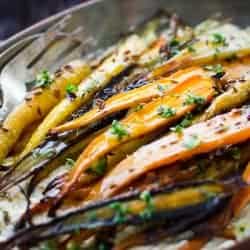
Cumin and Honey Roasted Carrots, Ricotta, and Gremolata
Print Recipe Pin RecipeIngredients
For the carrots:
- 1 pound carrots (from 2 smallish bunches)
- 2 tablespoons olive oil
- 2 tablespoons honey
- 1 teaspoon cumin seeds
- 1/4 teaspoon fine sea or kosher salt
- 1/4 teaspoon red chile flakes
- 12 ounces good quality, whole milk ricotta
- juice of 1/2 a lemon
- finishing salt, such as Maldon flake
- black pepper
For the gremolata:
- small handful mint leaves
- small handful carrot greens
- 1 small garlic clove
- zest of half a lemon
Instructions
Roast the carrots:
- Position a rack in the center of the oven and preheat to 375ºF.
- Trim and scrub the carrots, reserving the greens. Slice larger carrots in half lengthwise, and halve crosswise if longer than 6 inches. Place the carrots on a baking sheet, drizzle with the olive oil and honey, and sprinkle with the cumin, chile flakes, and salt. Roast, tossing occasionally, until the carrots are golden and collapsing in places and very tender, 20-30 minutes.
- Spread the ricotta in the bottom of a medium-sized baking vessel. Top with the roasted carrots and any good stuff that's stuck to the pan. Bake until the ricotta is warmed through, 5-10 minutes.
Meanwhile, make the gremolata just before serving:
- Place the herbs on a cutting board, and use a microplane (or the finest holes on a box grateto grate the garlic clove and lemon zest over the herbs. Use a sharp chef's knife to chop everything together.
- When the ricotta and carrots are done, remove from the oven and sprinkle with some of the gremolata (you may not need all of it), a good squeeze of lemon juice, a few pinches of flaky salt, and a grind or two of black pepper. Serve warm or at room temperature.
Notes
Nutrition
Cumin and Honey Roasted Carrots, Ricotta, and Gremolata
Inspired by a contorno I enjoyed at Pizzeria Delfina in Burlingame
This dish is all about the carrots, so use the sweetest, freshest ones you can find. Save the greens for making the gremolata. I have a physical dependency on Bellwether Farm's whole milk, basket-dipped ricotta and highly recommend it here. Alternatively, you can make your own. Don't prepare the gremolata until you're about to serve the dish, as the mint will blacken. I don't mind making a meal of this, a green salad, a hunk of bread, and a glass of wine, but you can also serve it as a first course or contorno, or to the side of grilled meat of some sort.
Serves 4-6 as a first course, 2-3 as a main course
For the carrots:
1 pound carrots (from 2 smallish bunches)
2 tablespoons olive oil
2 tablespoons honey
1 teaspoon cumin seeds
1/4 teaspoon fine sea or kosher salt
1/4 teaspoon red chile flakes
12 ounces good quality, whole milk ricotta
juice of 1/2 a lemon
finishing salt, such as Maldon flake
black pepper
For the gremolata:
small handful mint leaves
small handful carrot greens
1 small garlic clove
zest of half a lemon
Roast the carrots:
Position a rack in the center of the oven and preheat to 375ºF.
Trim and scrub the carrots, reserving the greens. Slice larger carrots in half lengthwise, and halve crosswise if longer than 6 inches. Place the carrots on a baking sheet, drizzle with the olive oil and honey, and sprinkle with the cumin, chile flakes, and salt. Roast, tossing occasionally, until the carrots are golden and collapsing in places and very tender, 20-30 minutes.
Spread the ricotta in the bottom of a medium-sized baking vessel. Top with the roasted carrots and any good stuff that's stuck to the pan. Bake until the ricotta is warmed through, 5-10 minutes.
Meanwhile, make the gremolata just before serving:
Place the herbs on a cutting board, and use a microplane (or the finest holes on a box grater) to grate the garlic clove and lemon zest over the herbs. Use a sharp chef's knife to chop everything together.
When the ricotta and carrots are done, remove from the oven and sprinkle with some of the gremolata (you may not need all of it), a good squeeze of lemon juice, a few pinches of flaky salt, and a grind or two of black pepper. Serve warm or at room temperature.


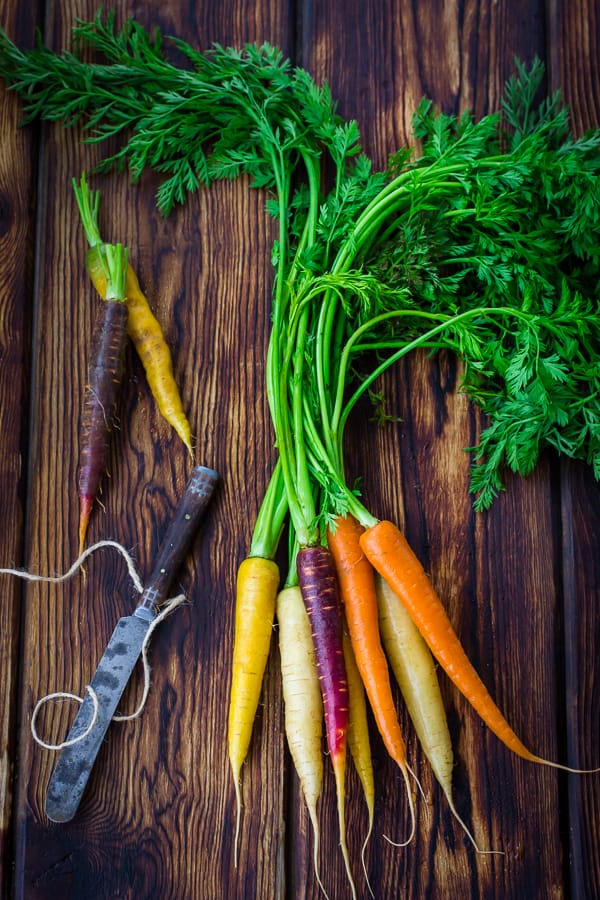
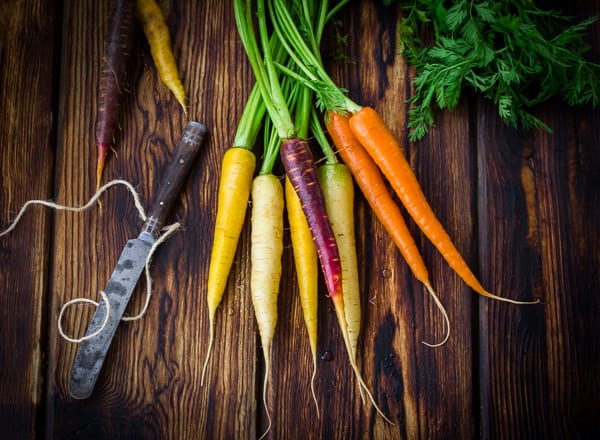


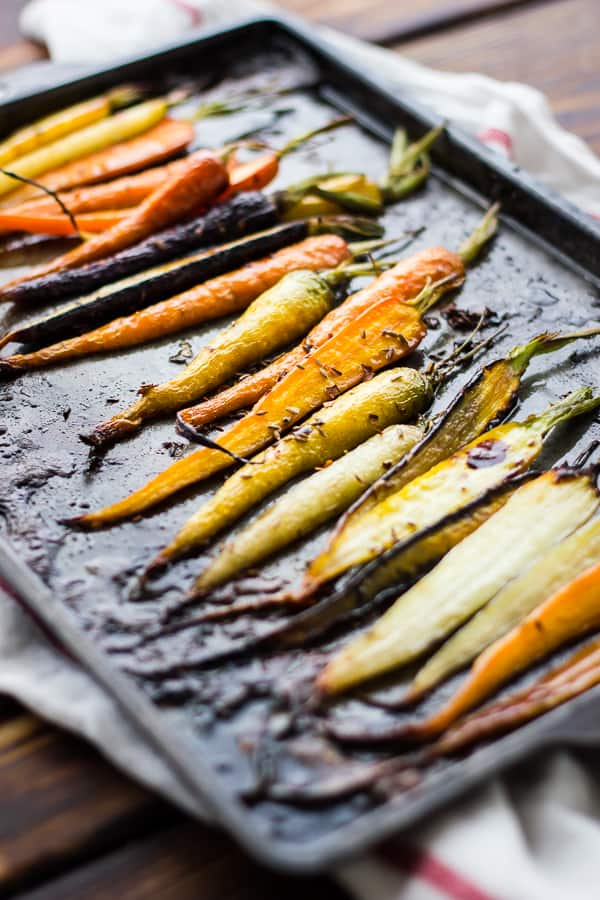
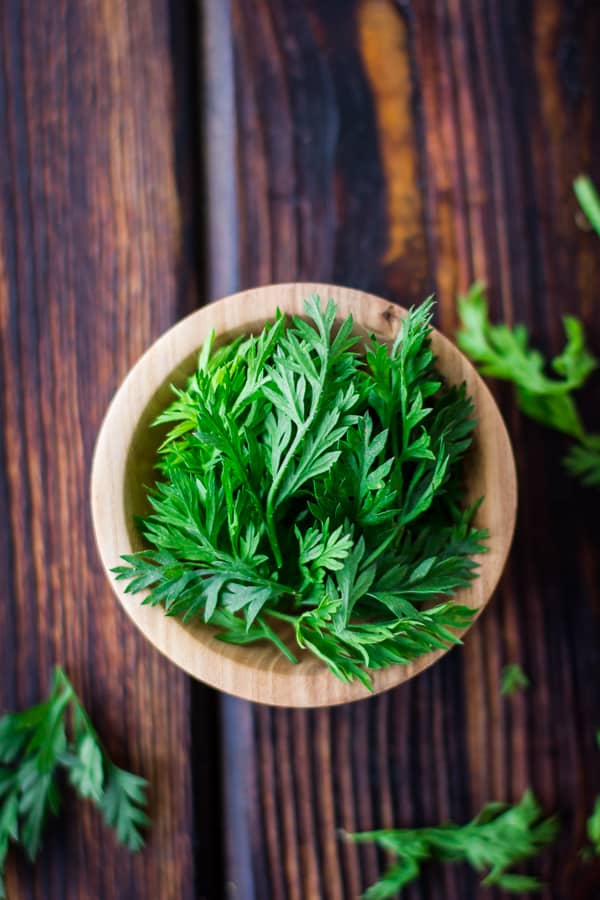
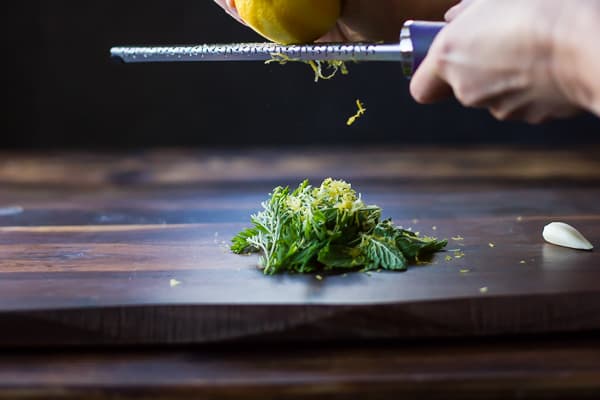
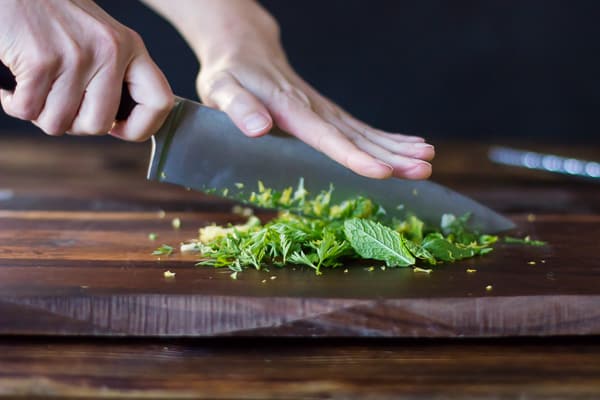
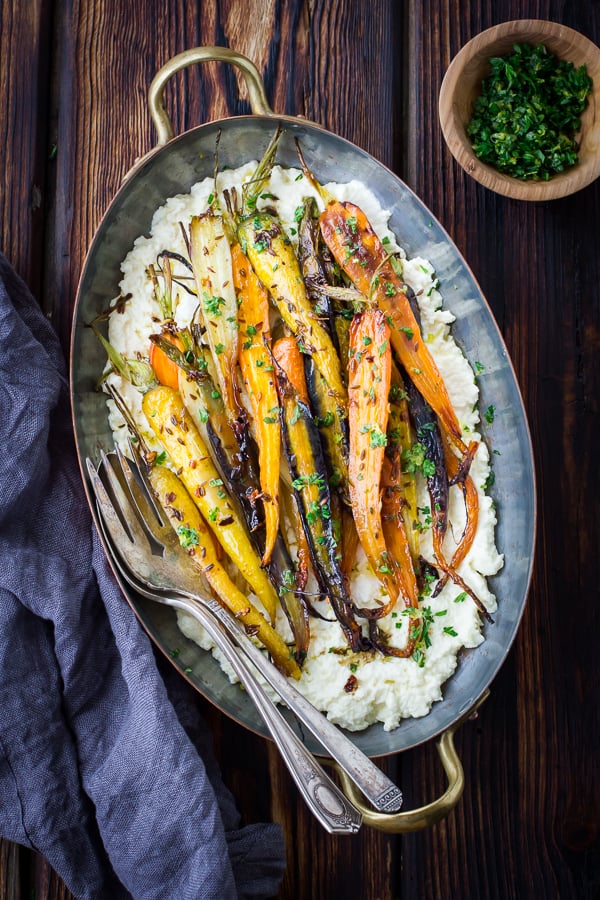
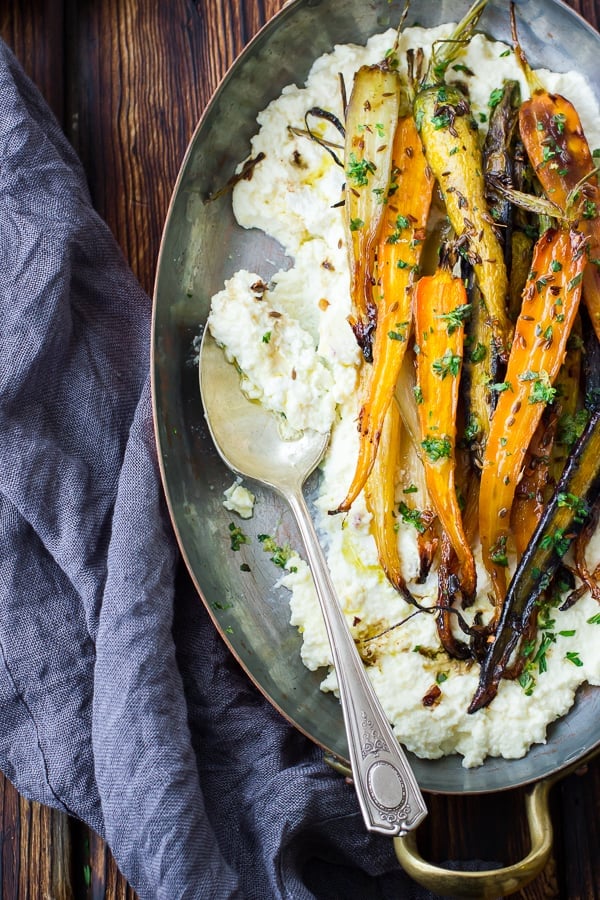

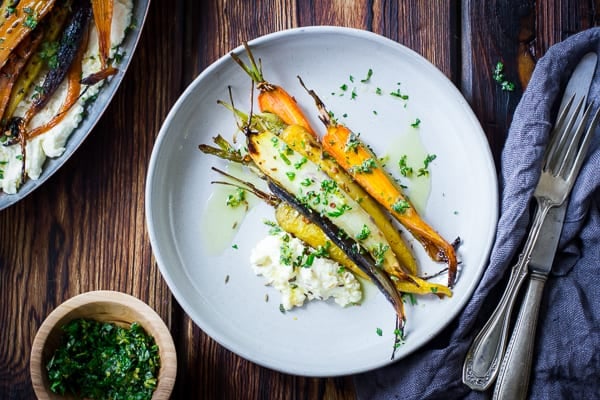

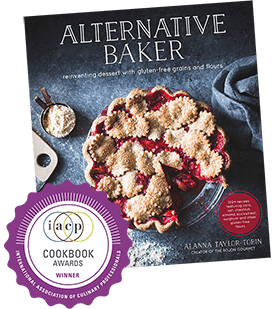

Diana says
So great of you to share this experience. Your voice, your expertise, and your life's work are worth way more than what they were offering. You made a solid decision. I'm sure other doors will open.
Alanna says
Thank you so much for reading, Diana, and for the kind words of encouragement. That means a lot to me.
Thea @ Baking Magique says
Thanks for sharing your cookbook experience! I think I would have done the same as you did. Or at least I hope I would, because one should never underestimate their own value. It's easy to accept whatever's offered because you feel flattered. Hope you'll get a cookbook deal in the near future! :)
Alanna says
Aw, thank you Thea for reading and for the kind note. :)
themanhattanfoodproject says
What a compelling, frank, and eye-opening read. Thank you for sharing it so openly.
Alanna says
You're so very welcome, thanks for reading.
Yummy says
Those carrots look great
Alanna says
Thanks!
Lili says
Hi Alanna, thank you so much for being so open and honest! I absolutely adore your blog and as somebody who fell in love with food photography in her 30s and just started to learn basic things two years ago, started a blog a month ago and full of dream, ideas and creative energy, I find this post more than useful and eye opening! Considering the amount of work you've put into your blog/photography over the last few years and your talent, I am sure that sooner or later your dream will come true and you will get a cookbook deal you deserve! :-)
Alanna says
Aw, thank you so much for the kind note Lili. Wishing you the best of luck in your endeavors, too!
Roger @ Madeleine Effect says
Beautiful Carrots! I help my wife on her baking blog so I oddly have spent hours and days looking at photographed carrots, planning carrot shots, lighting carrot shots (we had to have 3 carrot cakes to get that recipe right) and these are the best. My wife just showed me your site and the first thing I did was go to about, followed the link on the cookbook, and had the great read of how not to work 60 hours a week go crazy for 10 grand and carrots, beautiful carrots.
I have hours and days to go exploring your blog, I bet the rest is just as tasty!
erick says
Recently bookmarked your site and followed on IG, so today I turned to your "about" page out of curiosity, followed by clicking on your publishing a book ordeal. I am not interested in publishing a book, but I have been in the food business (corporate side) for over 25 years. Many years ago, on a red-eye flight back to the east coast, I picked up a magazine and turned to a page where a seminar was being advertised. I never forgot a quote underneath the gentleman's picture, "You are not worth what you get paid; you are worth what you negotiate." Best advice I've ever read, and dispensed. As a consultant, my very first deal, the restaurateur told me afterwards that he chose me because "you were firm when I asked you why you were more expensive..." He recalled that after my presentation, I flipped to the last page, gave him a pen, and shut-up. He asked me, "What? You want me to sign this?" "Yes," I replied (I read another book where the author said that salespeople talk themselves out of a sale, so I was brief). Anyway, I know that you didn't sign-on with the publisher, but you did yourself a humongous service by not selling yourself short. You are too friggin talented. In this world where there are so many non-industry professionals putting out garbage books and blogs, you are obviously miles ahead. Continue building your brand and you shall reap the rewards.
The carrots look lovely btw...
Ann {Created To Cook} says
Hi Alana,
This is my first time visiting your site. I can't believe that I've been missing out on your blog all these years. Your recipes and food photography are just GLORIOUS! And your writing makes me wish you were my real life friend and next door neighbor. (I only found you because, Nicole B... a food blogger friend shared this post with me). Thank you SO MUCH for being so open and honest about your experience. Thank you also for being SO dilligent in your research. I, along with many other bloggers will benefit from the information that you shared. I'll be happily following you on your blog and look forward to reading a future post when you get to share about how you'll be writing the book you always dreamed of, and how you got a great book deal. Lots of Love and Continued Success to You!
download lagu mp3 says
Recently bookmarked your site and followed on IG, so today I turned to your “about” page out of curiosity, followed by clicking on your publishing a book ordeal. I am not interested in publishing a book, but I have been in the food business (corporate side) for over 25 years. Many years ago, on a red-eye flight back to the east coast, I picked up a magazine and turned to a page where a seminar was being advertised. I never forgot a quote underneath the gentleman’s picture, “You are not worth what you get paid; you are worth what you negotiate.” Best advice I’ve ever read, and dispensed. As a consultant, my very first deal, the restaurateur told me afterwards that he chose me because “you were firm when I asked you why you were more expensive…” He recalled that after my presentation, I flipped to the last page, gave him a pen, and shut-up. He asked me, “What? You want me to sign this?” “Yes,” I replied (I read another book where the author said that salespeople talk themselves out of a sale, so I was brief). Anyway, I know that you didn’t sign-on with the publisher, but you did yourself a humongous service by not selling yourself short. You are too friggin talented. In this world where there are so many non-industry professionals putting out garbage books and blogs, you are obviously miles ahead. Continue building your brand and you shall reap the rewards. This is my first time visiting your site. I can’t believe that I’ve been missing out on your blog all these years. Your recipes and food photography are just GLORIOUS! And your writing makes me wish you were my real life friend and next door neighbor. (I only found you because, Nicole B… a food blogger friend shared this post with me). Thank you SO MUCH for being so open and honest about your experience. Thank you also for being SO dilligent in your research. I, along with many other bloggers will benefit from the information that you shared. I’ll be happily following you on your blog and look forward to reading a future post when you get to share about how you’ll be writing the book you always dreamed of, and how you got a great book deal. Lots of Love and Continued Success to You!
Jordan says
Okay, this post speaks to me on so many levels, and I'm so glad that you are who you are!
I'm doing research today about the process of writing a cookbook since I've had an idea I really like, and I want to go into it with joy, but also with realistic expectations and with eyes open. I can't thank you enough for being so forthcoming in this blog post, even down to the money details. I actually work for a nonprofit whose focus is getting people published (no cookbook expertise though, unfortunately). In all my time talking with authors and publishing industry folks, I've never seen someone be so completely transparent about the money side of things. I didn't think it was possible to be a bigger fan of yours, but I am now!
Also the part about you working on a novel but then falling in love with recipe writing? Um, also me.
Alanna says
Aw you're so sweet! I'm so glad this post was helpful - that was exactly my intention with writing it and being open about the financials. Happy to chat on the phone if you have more questions or are looking for more advice. :)
Jordan says
I am just floored by your generosity! Thank you so much!!!! My mom is coming into town so my attention is a bit divided -- is it okay if I email you in a few weeks to set something up? <3